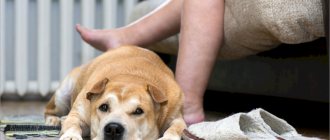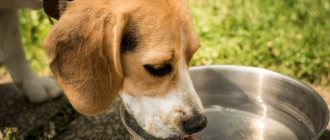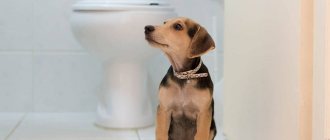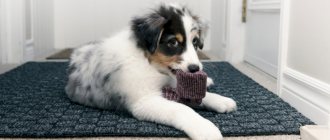When your dog can't poop, it worries everyone. Whatever the source of the constipation, knowing your dog is uncomfortable makes the day a bummer. So what can you do if your dog can't go to the toilet?
There may be no easy answer to how to get your dog to go to the toilet quickly, but that doesn't mean you can't help your friend. While there is no magic cure to get your puppy to poop, here are some tips (hopefully) that will help get him back on track.
How can I tell if my dog is constipated?
Most dogs poop once or twice a day, although this depends on the dog and its diet. A day or two without going to the toilet is not a cause for concern as long as the bowel movements are normal sized and your dog has no difficulty in doing so.
In contrast, when stool remains in the colon for two to three days, it becomes dry and hard. In this case, your dog will have to work hard to evacuate them. Sometimes the stool is accompanied by blood or mucus. If constipation persists, it can affect the functioning of your dog's colon, so it is advisable to contact your veterinarian. Additionally, constipation may be caused by a medical condition that requires professional treatment or may be serious, such as certain tumors or cancer.
In addition to no stool or hard, dry stool, your dog may have anal inflammation, bloating, stress, lethargy, or lack of appetite. When the problem persists, episodes of vomiting may occur.
© shutterstock
When should you see a doctor?
It is worth noting that attempts to eliminate constipation at home can only be done when the animal feels normal and has not had a bowel movement for no more than 3 (maximum 4) days. In some cases (for example, with intestinal obstruction), defecation can only be established surgically or with special medications that can only be prescribed by a specialist.
In addition, constipation is only a symptom of some disease, therefore, in order to save the animal from problems with bowel movements in the future, you will need to find out the cause of problems with bowel movements. For worms, for example, you will need to administer dewormers, for stress - sedatives, for bacterial diseases - antibiotics, and so on. You should dial the doctor’s number as soon as possible if:
- The dog is feeling nauseous and has a number of dangerous symptoms (refusal to eat, breathing problems, bad breath, etc.);
The animal refuses food;
When trying to feel the belly, the dog runs away or begins to “cry”;
If the animal has not pooped for more than 4 days;
Reasons why a dog can't poop
Some of the most common reasons why a dog cannot go to the toilet include the following:
- Your dog is not drinking enough water. The small amount of water they swallow goes directly to the intestinal wall, causing the stool to become dry, hard and difficult to pass.
- Ingestion of foreign materials such as bone chips, hair, grass, cellulose, fabric, paper or other substances. The undigested material mixes with the stool and forms stones in the colon.
- Some drugs cause constipation as a secondary side effect.
- Hypothyroidism can cause chronic constipation.
- Sometimes the dog deliberately ignores the urge to go to the toilet. These inhibitions often develop in dogs during house training. When they are left alone for long periods of time, they control the urge to defecate. They may also refuse to go to the toilet when hospitalized, in nurseries or when traveling.
- Your dog is not getting enough fiber.
- Lack of exercise. Exercise helps intestinal transit by reducing dry and hard stools.
- Any condition or disease, for example: colitis, anorectal obstruction, intestinal obstruction.
- Your dog is old. Older dogs have more problems with intestinal transit.
- Some tumors and cancers cause constipation.
If your dog is unable to eliminate, or if bowel movements occur but are painful, or if the stool contains blood or mucus, you should contact your veterinarian.
Predisposing factors
Constipation in a small puppy often occurs in cases where the animals receive too little to drink (and indeed liquids in general). However, the reasons are much more varied. We will list the most common cases that veterinarians encounter on a daily basis.
Negative effects of diet
The characteristics of feces very much and directly depend on what and how you feed your pet. In particular, if there is insufficient dietary fiber and moisture, your puppy is guaranteed to become constipated.
You must always remember the following circumstances:
- Food should always contain fibrous components, since without them, intestinal peristaltic activity will be low. Fibers ensure the bulkiness and soft consistency of feces, ensuring their natural removal from the animal’s body. The simplest option, familiar to many experienced dog breeders, is regular pumpkin puree.
- With almost all constipation, your pet will develop dehydration to some degree. In mild cases, simply giving your puppy plenty of water is enough to help his digestive system function properly. However, increasing the volume of drinking helps only in cases where the real cause of constipation is dehydration. In other situations, timely hydration will help remove at least some of the toxins from the body, but will not eliminate the immediate cause.
- A very common cause of constipation is low-quality food - cheap dry food or, on the contrary, “pure natural food”. No matter how paradoxical it may seem, feeding a puppy only fresh meat is no less harmful than if the animal constantly ate only dry food. Improper feeding leads to a deterioration in the peristaltic activity of the intestines, the accumulation of feces and, accordingly, constipation. It’s even worse when during this period the owners try to whet the puppy’s appetite by giving him... the same meat. Remember, when your pet suffers from persistent acute constipation, you cannot give him protein foods! It will rot in the intestines, which will lead to the development of life-threatening intoxication.
- Finally, sudden changes in diet can also cause constipation. For example, if you decide to switch your pet to canned food, then you need to do this gradually, over at least ten days. If you suddenly change the puppy’s usual food to a new one, then digestive problems will definitely begin (although diarrhea is more likely, but constipation is also possible).
- Constipation is typical with artificial feeding. And the point here is not even in the characteristics of the nutritional mixture. Many owners do not know that puppies need to massage the genital and anal area at least four to five times a day, since their defecation and urination reflexes have not yet fully developed.
Effect of stress factors
If you have just brought a puppy home, having taken it from its old owner, this will in any case be extremely stressful for the baby. Dogs are extremely susceptible to stress and react very sharply to any changes in their usual environment. And this condition is fraught with deterioration or, on the contrary, activation of peristalsis.
Stress in puppies is often accompanied by either severe diarrhea or equally severe constipation. Sometimes these states alternate, which adds headaches to the owner.
Interestingly, some animals (which are surprisingly reminiscent of humans) like to “eat up” stress, starting to sweep away food at the speed of an electric broom. Considering that the activity of the digestive system at this time is greatly reduced, it is not surprising that most of the absorbed food is not digested, but begins to be “stored” in the intestinal lumen. In most cases, this problem gradually resolves spontaneously, as the animal’s body adapts to new conditions.
But if stress constipation persists for more than a day and a half, be sure to contact your veterinarian.
Colon obstruction
Partial or complete blockage of the lumen of the large intestine always leads to problems with defecation, since feces physically cannot move towards the anus. The most common cause of such constipation is the animal swallowing something inedible. Puppies are naturally curious and will eat anything they can swallow (or tear apart and then eat).
If you buy any toys for your puppy, be extremely careful about whether the seller has certificates confirming the sufficient mechanical strength of the product and the origin of the materials (they should not be toxic even if swallowed). Such signs are extremely dangerous and are fraught not only with constipation, which, compared to other problems, looks like just a trifle, but also with death.
If you suspect your puppy has stopped pooping after a sock or toy mysteriously disappeared, call your veterinarian immediately.
In addition, some puppies have a bad habit of licking their paws (and entire body), as a result of which a lot of hair accumulates in their digestive tract. The worst thing is when the pet belongs to representatives of long-haired breeds. When consumed regularly, fur falls into large balls that can completely clog the lumen of the digestive tract.
Even when the fur does begin to come out, there is a chance that it will simply plug the anus. It is very easy to find out about this - long shaggy hairs stick out from the puppy’s anus, heavily soiled with feces. Again, if the puppy itself resembles a yeti due to the thickness of its coat, it is possible that the hair will become matted near the anus, which is why the pet cannot defecate normally. The latter case falls under the definition of mechanical constipation.
Use of certain medications
If you use any medications to treat your puppy, be sure to consult your veterinarian before administering them. Well, or at least read the instructions carefully, paying special attention to the section with possible side effects.
There are certain medications that are more likely to cause constipation than others. Among them are antihistamines used in the treatment of allergies, possible constipation after anthelmintic, as well as... antidiarrhea medications. If you get carried away with them and give the puppy too much, then one problem will give way to another. If your pet develops constipation due to a medication prescribed by your veterinarian, notify your veterinarian immediately. We would not recommend stopping the medication on your own - it is quite possible that digestive problems are much better than the symptoms that may arise from abruptly stopping the medication.
Important! Please note that constipation in suckling puppies can (more precisely, almost certainly) be caused by the treatment of their mother. Almost all medications somehow end up in milk, and from there into the digestive system of her cubs.
Systemic diseases
Unfortunately, constipation can only be a sign of some serious systemic disease. In particular, tumors, bacterial infections, perineal hernias and even kidney pathologies can lead to digestive problems. By the way, how can kidney disease and congestion in the intestines be related?
It's simple - the animal's body begins to secrete too much fluid, and compensates for its lack by drawing water from the finished feces. The most dangerous are neoplasms, as they can completely block the intestinal lumen. It is impossible to identify these diseases at home, so you should immediately seek help from a veterinarian.
Lack of physical activity
Be sure to take your puppy for walks every day. Lack of physical activity can lead to the development of not only constipation, but also obesity and other dangerous pathologies, so take the time to walk your pet.
Postoperative constipation
The combined effect of anesthetics used before and after surgery very often inhibits intestinal motility. Breeders who ignore the veterinarian's recommendations and immediately begin to feed their pet heavily after recovery from anesthesia are very often forced to subsequently treat the puppy for constipation.
Dog has fecal lumps
A fecal compaction is a hardened mass of stool in the rectum and colon. Dogs that suffer from them, despite constant and vigorous efforts, pass small amounts of feces or do not defecate at all. They are often lethargic, without appetite, with bloating and vomiting. They may remain hunched over.
Fecal impactions require veterinary examination and treatment. You will need to rehydrate your dog intravenously before removing them. Most fecal impactions are removed under general anesthesia.
First aid
In most cases, constipation is caused by the animal's poor lifestyle. An unprepared owner may easily not know how long the dog needs to walk and how to feed him. Therefore, constipation may not be caused by diseases or pathologies and may not require the use of medications.
Products with laxative effect
If your dog is constipated, what to do at home, how not to try to correct the situation with folk remedies. It is highly not recommended to give human laxatives to dogs, such as Duphalac, Bisacodyl, without appropriate prescriptions from a doctor.
At home, a person may not guess the dosage or may not know about certain individual characteristics of the pet. It is recommended to feed the following foods:
- Give your dog kefir before bed. If the pet does not want to drink it, it is recommended to drink it using a syringe. For small individuals, such as a Yorkshire terrier, a Chihuahua or a Spitz, a couple of tablespoons will be enough. Large dog breeds should be given about half a glass.
- Plums and prunes have a laxative effect.
- You can allow your pet to eat raw beets or carrots.
Note! You should not feed an animal that cannot poop on its own with all these foods, since the pet does not want to eat at all. It is recommended to select one thing from the list and try to resolve the situation.
Enema
Whether your Yorkie is constipated or your Shepherd is constipated, you need to act quickly. An enema is suitable as such a remedy. She guarantees immediate and 100% results.
It is required to be done only if the pet’s constipation is not due to intestinal obstruction or as a result of any disease. In this case, an enema will only cause harm.
It is recommended to add a drop of Vaseline oil to the solution, but it must be slightly heated. The rubber bulb must be inserted into the animal's anus carefully and slowly.
Attention! If the fluid does not pass, this may indicate an intestinal obstruction. In this case, the animal should be taken to a veterinarian.
Enema for a dog in a veterinary clinic
Vaseline oil
Vaseline oil is often used to treat constipation. It softens feces and improves intestinal motility. The product is considered harmless for use on animals because it is not absorbed into the intestinal wall, but is released naturally.
It is recommended to add the oil to any treat and give it to your pet. It must be warm before use. For small breeds of dogs, such as pugs or Pekingese, half a teaspoon is enough. Large dogs should be given one and a half to two teaspoons. You need to give this drug twice a day until bowel movements become regular.
What to do if your dog has anorectal obstruction?
A common cause of anorectal obstruction is an enlarged prostate that protrudes backwards and puts pressure on the rectum. This happens more often in older males. As a result of this problem, the dog is unable to go to the toilet.
In other cases, obstruction occurs due to the passage of foreign bodies through the gastrointestinal tract.
This may also be due to a fracture of the pelvic bones.
In some breeds, such as Boston Terriers and Curly-tailed Bulldogs, a rigid extension of the tail extends over the anal canal, pressing it against the pelvic floor.
© shutterstock
Other causes of anorectal obstruction are stool blockage, stool caking around the anus, rectal strictures, perianal gland tumors, polyps and rectal cancer.
Anorectal obstruction weakens the muscular support of the rectum and negatively affects bowel movements. The main symptom is an effort to pass stool, which may be flat or ragged and sometimes accompanied by blood.
Treatment depends on the cause of the blockage. In most cases, foreign bodies are removed digitally under sedation or anesthesia. In other cases, surgery is required.
Why is constipation dangerous for animals?
When your dog is constipated, his stomach hurts because the feces press on his insides, making it difficult to move. But not only discomfort can arise in such a situation. If treatment is not started on time, this can lead to:
- intoxication;
- intestinal rupture;
- damage to internal organs;
- problems with the cardiovascular system due to increased stress.
When the intestines rupture, feces enter the peritoneum, leading to peritonitis and death. Death occurs with constipation within a week in an adult pet, within 3-4 days in a puppy aged 2-3 months, and even faster in newborns.
X-ray of coprostasis in dogs
The dog has false constipation
False constipation is caused by hair or threads around the anus that become covered with dry stool and prevent bowel movements. This occurs in long-haired dogs, usually after a bout of diarrhea. The skin becomes irritated, painful and infected, which introduces an element of arbitrary retention.
Dogs with false constipation are restless and bite and lick their anus. In other cases, they rub their butts on the ground, moan and try to evacuate in an upright position. It gives off a very unpleasant smell, and of course they can’t go to the toilet.
Treatment should cut the knots and strands of hair to eliminate the cause of the blockage. If the area is painful, this is best done under general anesthesia. You will then need to keep the area clean and apply a topical ointment.
Dogs prone to constipation should have the hair around the anus trimmed regularly.
Puppy doesn't poop
Puppies nursed by their mother will defecate frequently after each feeding. So if they don't, you should call for them to evacuate. To do this, after feeding, place the puppy on his back, resting his hand or knees, and placing a pillow under him. Prepare a basin with warm water and cotton wool or gauze. Moisten the cotton and pass it through the genital area and then through the anal area. Do this several times carefully. Lightly rubbing the abdomen also helps.
This type of stimulation mimics your native tongue and causes urination and bowel movements. When your puppy poops, clean and dry the area well.
If your puppy does not urinate or defecate during the day, contact your veterinarian.
Problems with care
Poor care, especially for long-haired puppies, can also cause constipation. Some breeds, such as Pomeranians, can suffer from hairballs, just like cats, when grooming and ingesting hair.
In other cases, the fur under the tail becomes covered with feces and causes anal inflammation, which leads to painful bowel movements.
Keep puppies well groomed and the anal area of long-haired puppies trimmed to prevent mats from developing.
Diet for a constipated dog
Some foods are very helpful for dogs that can't poop:
© shutterstock
- Pumpkin . Pumpkin contains a large amount of water and is an excellent source of fiber. Try making fresh pumpkin puree for your dog, she will love it and can use it to go to the toilet.
- Fruits and vegetables . Green beans, broccoli, zucchini. Green leafy vegetables are rich in fiber.
- Protein . The diet should include good quality protein.
- Water . Sometimes constipation occurs due to dehydration.
- Supplements . Pre and probiotics, folic acid and digestive enzymes are important for a constipated dog.
- Laxatives . Your veterinarian may recommend a laxative for your dog. Don't give it to him without his recommendation.
- Enemas . Like laxatives, enemas are a remedy for your dog's constipation that your veterinarian will prescribe if necessary.
Treatment
Many novice dog breeders, when faced with constipation in a puppy, make the same typical mistake. They more or less know what they use to treat congestion in humans, and therefore begin to give the same medications to the animal. Under no circumstances should you do this!
Medicines for humans are developed taking into account the biochemical characteristics of people, and therefore how these drugs will work in dogs is unknown (more precisely, it is known - in most cases such “treatment” ends badly). If you do not have the opportunity to show your pet to a veterinarian, then at least consult with him by phone. The doctor will tell you which medications can be given to your pet.
Here are the main recommendations that we would advise you to follow:
- Despite all of the above, there are some constipation remedies that are equally suitable for both animals and humans. A good example is Lactulose .
- Use petroleum jelly (liquid paraffin) with caution. Firstly, it is not effective for all types of constipation. Secondly, if you force it down your puppy’s throat, the dog may inhale the drug. If Vaseline enters the lungs, it may well cause lipoid pneumonia.
- Do not try to cure constipation in a newborn puppy with cereal! Yes, foods rich in fiber are often recommended by nutritionists to people who often suffer from constipation. But the dog’s digestive system is radically different from the human one, and therefore nothing good should be expected from such a diet.
We strongly advise against giving your animal enemas or suppositories on your own without first consulting a veterinarian. Never use commercial enemas containing sodium phosphate to treat puppies. An enema with this substance is deadly to animals. Below we list the safest remedies that can be safely used to treat constipation at home.
Pumpkin
Many experienced breeders know about this miraculous remedy. We recommend using baby food: simply mix it with canned puppy food in a 30:70 ratio. Just one teaspoon a day is enough for your baby to reduce the likelihood of constipation to almost zero. However, some puppies quite willingly eat pieces of steamed pumpkin (for which some of it can be frozen for the winter). The secret of this simple remedy lies in the huge amount of dietary fiber contained in pumpkin.
Puppies who are initially prone to constipation should regularly include this product in their daily diet. Some breeders and even veterinarians believe that bran has a similar effect, but we would not recommend using it. Once again, plant foods (and grains in particular) are not suitable for the digestive system of dogs, which are carnivores by nature. From bran, in particular, pets often develop severe flatulence. And pumpkin is one of the rarest products of plant origin, which is well absorbed by the gastrointestinal tract of dogs.
Veterinarian-approved mild laxatives
As we have already said, if your puppy is constipated, it is never a bad idea to consult a specialist: perhaps he will recommend some mild laxatives that will not harm your pet’s health. The problem is that we cannot advise them: there are hundreds of dog breeds, and some of them do not respond to medications that work great for other animals.
Constipation in a one-month-old puppy can be relatively safely eliminated by giving the pet 0.5 ml of Duphalac (Lactulose) for each kilogram of its live weight. Try to refrain from giving too much medication: if overdosed, many of them cause diarrhea. The dosage is especially important in puppies of small breeds: if it is unreasonably increased, the pets simply “throw out” from severe diarrhea, and severe dehydration may develop.
Fermented milk products (use with caution)
For puppies, whose digestive system is naturally designed to digest milk, fermented milk products can be a good alternative to specialized medications for constipation. They contain a lot of beneficial symbiotic microflora, and the acids also included in these products have the ability to stimulate intestinal peristaltic activity.
Let’s just warn all breeders right away - please don’t overuse “milk”! You can give your puppy no more than a quarter of a teaspoon of high-quality yogurt per day. The duration of therapy is no more than three days. Otherwise, your pet may develop severe diarrhea.
Drink plenty of fluids and take long walks
Always ensure that your baby always has access to clean, fresh drinking water. Drinking plenty of fluids is a good first aid for many types of constipation. If your puppy drinks enough fluids, the likelihood of constipation will be greatly reduced. Also, walk him daily for at least one hour. Physical activity helps maintain peristalsis at the proper level.
Massage
If your puppy is feeling unwell, a massage is a good solution. In cases where you spend a few minutes with your pet, thoroughly massaging its tummy for at least 15 minutes, digestive problems can be quickly eliminated.
Please note that massage gives the best results when you move the puppy’s belly from top to bottom, as if “squeezing” toothpaste from a tube. This technique is good because it activates a physiological reflex (bitches also lick and massage the puppies’ bellies, trying to encourage the start of defecation).
How to prevent constipation in a dog?
- Good hydration . Make sure your dog always has fresh, clean water. If he exercises, give him water regularly.
- High fiber diet . Choose high fiber foods and foods to keep your dog's digestive system healthy.
- Regular exercise . Dogs need exercise. If your dog is not very active, be sure to take him for walks regularly. Lack of physical activity leads to various problems, including poor digestion.
- If your dog voluntarily refuses stool , give him several opportunities to do so. Walk your dog several times a day. It's better to go to a place where your dog is used to walking.
- You may need a mild laxative while traveling . Before giving your dog a laxative, consult your veterinarian.
- Beware of the bones . They may cause constipation. If your dog is prone to this condition, consider giving him nylon chew toys.
- If he has ingested foreign bodies , eliminate the cause and contact your veterinarian for an examination.
- If your dog is already old , his bowel activity will gradually decrease. You can help him by moistening the food with water and leaving the mixture for 20 minutes.
Correction of nutrition for constipation
The dog does not eat dry food: what to do if it did before
To prevent your dog from having to poop painfully, you need to adjust his diet. First of all, you need to give up a number of products as food:
- legumes;
- rice and corn;
- fatty broths;
- dry food;
- meat with a high content of veins and muscles;
- cheese;
- bones.
Important! You need to use either special food for your dog or prepare food separately for your pet. It should be liquid and warm during feeding. Don't give too much or too often.
The following foods will help improve intestinal motility:
- prune or plum;
- dairy products;
- boiled sea fish;
- vegetable stew;
- porridge.
The specialist will give certain recommendations on what exactly you should feed the dog and in what quantities. You can independently decide to refuse any foods, if the dog does not poop, this will not hurt.











